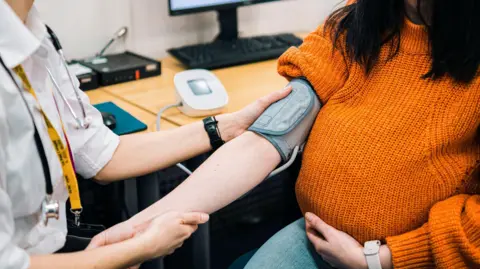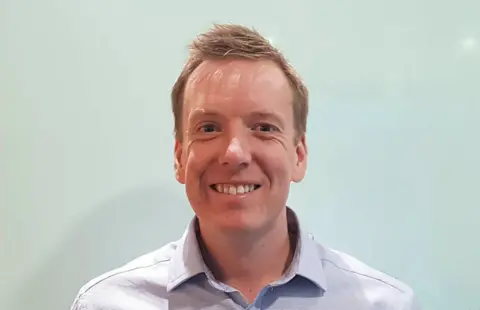GPs warn £290m funding gap threatens future of NHS
 Getty Images
Getty ImagesScotland's doctors have claimed a £290m funding gap for GP surgeries threatens the future of the NHS.
The British Medical Association (BMA) Scotland said GPs' share of the health service budget has fallen every year against inflation since 2008 and they cannot afford to hire more staff to cope with increasing demand.
The trade union says £290m is needed to fix this and has warned if it is not addressed in the coming months then the "current direction of travel" is leading towards a formal dispute with Scottish ministers.
The Scottish government said it has increased investment in general practice and is determined to increase the number of GPs in Scotland.
Research by BMA Scotland suggests the funding which GP practices receive for every patient has been eroded year after year against inflation since 2008.
Combined with increased costs, the union claims this has created a £290m shortfall that is impacting frontline GP services.
Dr Iain Morrison, chair of the BMA Scotland's GP committee, said: "Practices simply do not have the resources required to employ all the staff they need – and in particular GPs – at a time when demand is going up at a rapid rate.
"We know that access to GPs is undeniably a real issue and patients can struggle to get an appointment at their surgery in a timely manner.
"We share the frustration that many patients are currently feeling and we want to be able to deliver a service that we are proud of, rather than constantly apologising for."
Dr Morrison claimed that unless the £290m funding gap is addressed then general practice is "at risk of failing", adding: "We provide 90% of patient contact and without general practice, the NHS simply cannot survive."
 BMA Scotland
BMA ScotlandLast month the Royal College of GPs and the BMA said some practices are freezing recruitment and scaling back on the use of temporary staff cover in the face of severe financial challenges.
Trainee GPs have also told BBC Scotland News that they are struggling to find either permanent or temporary jobs.
Earlier this year John Swinney pledged his government will bring down NHS waiting lists and make it easier to get GP appointments.
The first minister said the health service would carry out an extra 150,000 appointments and procedures in the coming year.
'Direction of travel' towards dispute
The BMA has not yet formally consulted its members on taking the dispute further, such as going on strike.
But it said member surveys and motions carried at internal BMA conferences have backed considering further action.
The union said it had put the Scottish government "on notice that the current direction of travel is leading us towards formal dispute".
Scotland's health secretary Neil Gray told BBC Scotland's Lunchtime Live that he would give "due consideration" to the BMA's case.
He said: "The increased investment in general practice is £73.2m this year and we're determined to continue to support them because general practice is the front door of the health service and is absolutely critical to the running of the NHS."
Mr Gray cited inflation and the UK government's increase in national insurance contributions as having a "corrosive impact" on the finances of GP surgeries.
He added: "Our renewed plan for the NHS will ensure that a greater proportion of new funding goes to primary and community care which will assist in supporting both GPs and also helping people to access GP services."

The majority of GPs are self-employed. Each practice is a business, employing staff and receiving a fee from the NHS for every patient on their books.
But doctors tell us that over the last decade the complex funding model has not kept up with the cost of meeting growing demand from patients who need longer and more frequent appointments.
The government has said making it easier to access community healthcare is key to the future of the NHS but the question is how they choose to fund that.
The BMA argues that GPs should receive additional funds directly, so they can employ more doctors and decide which services would benefit their patients.
But the government may want to spend money on other parts of primary care, such as nurses, physios or mental health workers in community healthcare hubs.
GPs are under more pressure than ever before, so their union is now resorting to stronger language and raising the prospect of a dispute to make their point. But in reality, industrial action is still a long way off.

